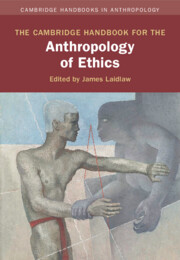Book contents
- The Cambridge Handbook for the Anthropology of Ethics
- Cambridge Handbooks in Anthropology
- The Cambridge Handbook for the Anthropology of Ethics
- Copyright page
- Contents
- Contributors
- 1 Introduction
- Part I Intellectual Sources and Disciplinary Engagements
- Part II Aspects of Ethical Agency
- Part III Media and Modes of Ethical Practice
- Part IV Intimate and Everyday Life
- 22 Care
- 23 Kinship and Love
- 24 Cooperation and Punishment
- 25 Favours
- 26 The Inimical Gaze
- 27 Animals and More-Than-Representational Ethics
- 28 God
- Part V Institutional Life
- Index
- References
27 - Animals and More-Than-Representational Ethics
from Part IV - Intimate and Everyday Life
Published online by Cambridge University Press: 11 May 2023
- The Cambridge Handbook for the Anthropology of Ethics
- Cambridge Handbooks in Anthropology
- The Cambridge Handbook for the Anthropology of Ethics
- Copyright page
- Contents
- Contributors
- 1 Introduction
- Part I Intellectual Sources and Disciplinary Engagements
- Part II Aspects of Ethical Agency
- Part III Media and Modes of Ethical Practice
- Part IV Intimate and Everyday Life
- 22 Care
- 23 Kinship and Love
- 24 Cooperation and Punishment
- 25 Favours
- 26 The Inimical Gaze
- 27 Animals and More-Than-Representational Ethics
- 28 God
- Part V Institutional Life
- Index
- References
Summary
This chapter argues that anthropological studies of human relationships with animals can draw our attention towards – rather than away from – the importance of representation within human ethical lives. The chapter posits that the anthropological ethical turn and the animal turn are each orientated in different ways to the concept of ‘representation’. This means the two traditions speak at cross-purposes to one another, visible particularly in their distinctive innovations in relation to ‘personhood’. From the perspective of the ethical turn, the personhood (or agency) attributed to animals by multispecies ethnographers appears ethically thin. From the perspective of the animal turn, the ethicists’ focus on varied human-held forms of reflection risks repeating dualistic distinctions and portraying animals only as they appear within human accounts. Yet the chapter shows that these two emerging traditions can benefit from one another, in attending to ‘more-than-representational’ (not non-representational) aspects of ethics. These include (1) the material/embodied form of ethical representations, (2) the fact that ethical life often seems inherently hard to represent, and (3) varied ethical attitudes towards representation (such as the ‘honesty’ sometimes associated with lack of speech) that can be seen as and when people interact with their animals.
- Type
- Chapter
- Information
- The Cambridge Handbook for the Anthropology of Ethics , pp. 677 - 705Publisher: Cambridge University PressPrint publication year: 2023

